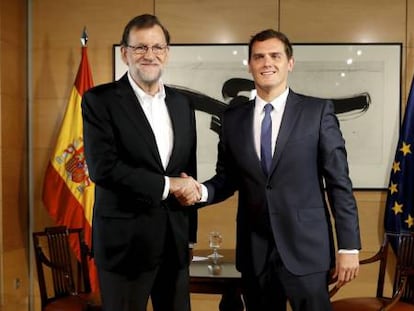Acting PM non-committal on minority party’s conditions for support
PP’s Mariano Rajoy and Ciudadanos leader Albert Rivera will meet today with no clear agenda


Ciudadanos, the minority party pushing acting Prime Minister Mariano Rajoy to form a government seven weeks after a second inconclusive general election in Spain, admitted on Wednesday it was surprised nothing had seemingly emerged from Rajoy’s meeting with his Popular Party’s (PP) national executive committee earlier in the day.
A week before, on August 10, Ciudadanos leader Albert Rivera had given Rajoy a six-point memorandum of conditions the PP would have to meet if it wanted his party’s support in forming a minority government. Rajoy then waited a week before meeting with PP leaders.
Even if Rajoy agrees to Ciudadanos’ conditions, he will still need the support of the Socialists and the regional parties to form a government
It seems that Rajoy, whose party won the most seats at the general elections in December and again in June, but failed to secure a majority, garnering 137 seats, is not prepared to allow Ciudadanos, which won 32 seats, to call the shots. Rajoy would need 176 seats for a Congressional majority.
Speaking after the meeting with the PP’s executive on Wednesday, Rajoy would say only that he had been “authorized” to negotiate with Rivera.
Speaking to reporters on Wednesday, Rajoy denied that he had called the PP’s national executive to discuss Ciudadanos’ proposals, despite having told Congress a week earlier this was the reason for the meeting. He even went so far to say that nobody at the meeting “had said a word” about Ciudadanos’ six points, saying only: “We may accept a lot of things, or we may not.”
The two will meet today, but no agenda for the encounter has been announced. If a deal is not reached, Spain could be headed to an unprecedented situation whereby it has to call a third general election.
Ciudadanos’ six points are that Rajoy must set a date for his investiture debate in Congress, expel party officials targeted in corruption investigations, end judicial privileges for elected officials, change electoral law, end amnesties and pardons in corruption cases, limit the prime minister’s mandate, and create a parliamentary commission to look into the so-called Barcenas case involving illegal cash payments to PP officials.
Rajoy has still not announced a date for a vote, but August 30 is seen as the most likely
Even if Rajoy agrees to these conditions, he will still need the support of the Socialists and the regional parties to form a government.
Socialist Party (PSOE) leader Pedro Sánchez is also playing a waiting game, insisting that his party, which won 85 seats in Congress, will not support Rajoy in a vote in Congress if he tries to form a government.
The PP has said it broadly accepts Rivera’s proposals, but that many of them could not be implemented “overnight” and would require changes to the Constitution and the approval of the other parties in Congress.
In turn, Ciudadanos says that its six points are non-negotiable and are the basis for negotiations in order for it to support Rajoy in Congress.
If Rajoy does not unequivocally say whether he accepts the six points, says Ciudadanos, then its 32 deputies will abstain in any investiture vote in Congress. Rajoy has still not announced a date for a vote, but August 30 is seen as the most likely.
Rivera is still hoping a third election in a year can be avoided and that the PP will use Ciudadanos’ 32 votes in Congress as part of Rajoy’s strategy to pressure the Socialist Party to abstain rather than voting against him.
English version by Nick Lyne.
Tu suscripción se está usando en otro dispositivo
¿Quieres añadir otro usuario a tu suscripción?
Si continúas leyendo en este dispositivo, no se podrá leer en el otro.
FlechaTu suscripción se está usando en otro dispositivo y solo puedes acceder a EL PAÍS desde un dispositivo a la vez.
Si quieres compartir tu cuenta, cambia tu suscripción a la modalidad Premium, así podrás añadir otro usuario. Cada uno accederá con su propia cuenta de email, lo que os permitirá personalizar vuestra experiencia en EL PAÍS.
En el caso de no saber quién está usando tu cuenta, te recomendamos cambiar tu contraseña aquí.
Si decides continuar compartiendo tu cuenta, este mensaje se mostrará en tu dispositivo y en el de la otra persona que está usando tu cuenta de forma indefinida, afectando a tu experiencia de lectura. Puedes consultar aquí los términos y condiciones de la suscripción digital.










































